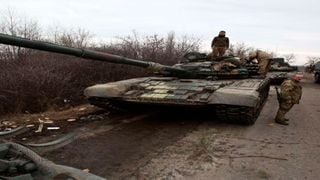
Ukrainian servicemen get ready to repel an attack in Ukraine’s Lugansk region on February 24, 2022 after the country was invaded by Russian forces.
| AFPWeekend
Premium
Nuclear showdown and the horrors of war in literature
What you need to know:
- There are many examples of the dark literature of war in fiction and non-fiction.
- Literature has accurately captured almost everything happening in the streets of Ukraine
At 4pm on October 27, 1962, the Joint Chiefs advised American President John F. Kennedy to order a military strike on Cuba within the next few hours. The CIA had detected Soviet missiles in Cuba and had assumed that the nuclear warheads that go with them had not yet been delivered.
The CIA recommended a huge air attack on the first day to clear all the missiles. What America didn’t know (until 30 years later) was that nuclear warheads had already been delivered to Cuba. President Kennedy sent a hardline message to the Kremlin — to then Soviet Premier Nikita Khrushchev.
Khrushchev was shaken and accepted to pull out the missiles from Cuba. A commemorative Time Magazine article said that, “Khrushchev accepted on Sunday. He was so worried that war would break out in the next six hours it took to encode and transmit a message from the Kremlin to the White House, he broadcast his response on Moscow public radio”. The world had been spared a nuclear war.
This 1962 threat of nuclear war is worth remembering now because on Sunday, February 27, 2022, Russian President Vladimir Putin, in a dramatic escalation following his invasion of Ukraine, ordered Russian nuclear forces put on high alert. This is probably the first time since the Kennedy-Khrushchev showdown that anyone has threatened to deploy nuclear weapons.
Horrors of war
As the battle between Russia and Ukraine rages, I remembered the dark literature of war in both fiction and non-fiction. Literature has accurately captured almost everything happening in the streets of Ukraine from the rattle of machine gun fire to the gargling sounds of bombs and artillery shells crashing into houses. The hammer of war is devastating, and literature has captured it in a chilling way.
Unfortunately, this is taking place in real life as Ukrainian forces battle the Russian army. The sad photos from Ukraine of shoppers caught in the crossfire; the dead still holding onto items they have just bought, items they won’t be needing.
This conjures up the horrific images as depicted in the non-fiction book entitled, Caen: Anvil of Victory by Alexander McKee, that recounted the horrors of the World War 2 battles in France. McKee writes about dead civilians and dead children (with their dolls scattered all over the place): “There were civilians lying by the roadside, loaded with personal belongings, often of no value at all, and stilling clinging to them in death. Close by a crossroads, caught by gunfire, lay a group of men, women and children. Unforgettable, the staring gaze of their broken eyes and the grimaces of their pain-distorted faces… discarded dolls littered the terrible scene”.
From fiction literature, one of the best books on the horrors of war is Chimamanda Ngozi Adichie’s Half of a Yellow Sun. Like in the current conflict between Russia and Ukraine, most of the characters in the novel didn’t see the war coming. Generally, there are signs but when war breaks out, it’s always somehow a surprise. Half of a Yellow Sun is based on the Biafran War in Nigeria when the region called Biafra attempted to secede from Nigeria. In the novel, there is jubilation the day Biafra seceded. “Odenigbo climbed up the podium waving his Biafran flag: swaths of red, black, and green, and at the centre, a luminous half of a yellow sun”. The novel derives its title from the luminous half of a yellow sun in the Biafran flag.
Mayhem and death
But the celebration of the secession of Biafra under Ojukwu was temporary because the Federal Government of Nigeria declared all-out war. Ojukwu gave the Biafrans the impression that he was prepared for the war because he kept saying, “No power in Black Africa can defeat us”. However, as one character noted, Biafrans “had no arms, no mobilisation troops, and that our men are training with wooden guns…apparently he (Ojukwu) has no arms at all and plans to defeat Nigeria with his fists”.
And the mayhem and death that followed Biafrans is unprecedented. And like any war, when it was all over, “all their great words were cancelled out” as D.H Lawrence would have put it. Adolf Hitler (and he would have known) once said that, “The beginning of every war is like opening the door into a dark room. One never knows what is hidden in the darkness.”
We hope that cooler heads will prevail in the Russian-Ukrainian conflict, so it comes to an end quickly as no one really wins in a war. And for Kenyans as we prepare for elections, we should shun all manner of violence as we can see from the reality of events in Ukraine and from historical literature and fiction, that we should never take peace for granted. May peace prevail in Ukraine and may peace prevail as we prepare for elections and after elections in Kenya.





